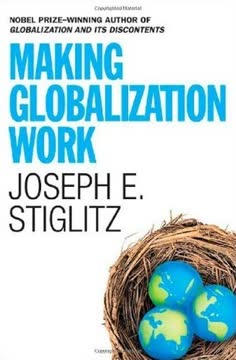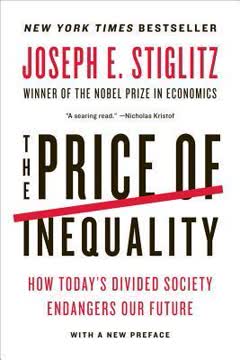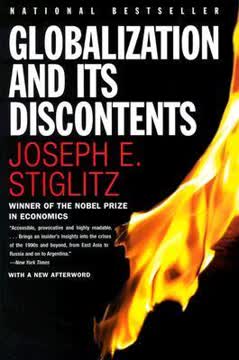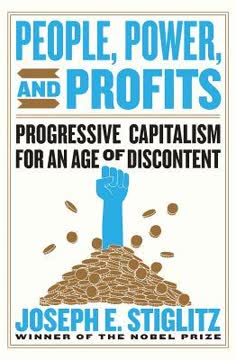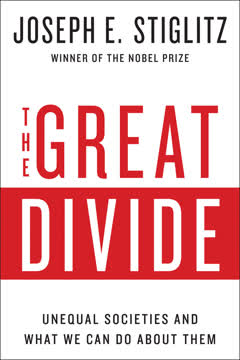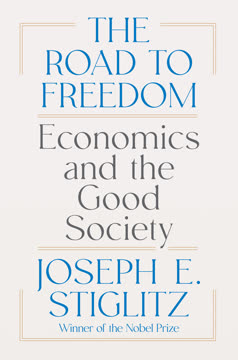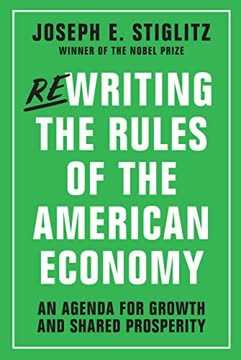Key Takeaways
1. Globalization's Potential vs. Its Discontents
The current process of globalization is generating unbalanced outcomes, both between and within countries.
Uneven distribution. Globalization, while promising prosperity, has led to unbalanced outcomes, with wealth concentrated in a few nations and individuals, leaving many behind. This disparity fuels discontent and questions the fairness of the current system.
Economic vs. Social Goals:
- Economic globalization focuses on integrating markets through trade and capital flows.
- Social globalization encompasses the flow of ideas, knowledge, and cultural exchange.
- The book primarily addresses economic globalization, highlighting its failures to meet social aspirations.
Need for Change. The motto "Another world is possible" encapsulates the desire for a more equitable and just globalization, one that prioritizes the well-being of all people, not just the privileged few.
2. The Complexities of Development
A developing country that simply opens itself up to the outside world does not necessarily reap the fruits of globalization.
No Magic Solutions. Development is a multifaceted process with no simple prescriptions. Strategies must be tailored to specific contexts, recognizing the interplay of markets, governments, and social institutions.
Beyond Economic Growth:
- Development encompasses improved living standards, health, education, and security.
- It requires a balance between private and public sectors, promoting equality and full employment.
- A narrow focus on GDP growth can mask underlying issues of inequality and environmental degradation.
Government's Role. Government plays a crucial role in creating a supportive environment for business, building infrastructure, and ensuring social justice. Successful development requires finding the right balance between government intervention and market forces.
3. East Asia's Managed Globalization Success
These countries simultaneously achieved growth and stability: some had not a single year of negative growth over a span of almost a quarter century.
Export-Led Growth. East Asian countries achieved remarkable economic growth by strategically engaging with globalization through export-led strategies. They carefully managed their integration into the global economy, prioritizing stability and equity.
Key Policies:
- High savings rates to fund investments
- Government planning and promotion of specific industries
- Investment in education and infrastructure
- Gradual liberalization to manage economic capacity
Rejecting Market Fundamentalism. East Asia's success demonstrates that rapid development is possible without fully embracing the Washington Consensus. Their experience highlights the importance of government intervention and careful management of globalization.
4. Latin America's Disappointment with the Washington Consensus
Latin America embraced the Washington Consensus policies more wholeheartedly than any other region...
Embracing Liberalization. In contrast to East Asia, Latin America adopted Washington Consensus policies, emphasizing privatization, deregulation, and trade liberalization. This approach led to short-term gains but ultimately failed to deliver sustainable growth and poverty reduction.
Unsustainable Growth:
- Growth was based on heavy borrowing and privatization of national assets.
- It did not address underlying issues of inequality and social justice.
- The region experienced a "lost decade" of stagnation and economic instability.
Rejection of the Consensus. Disillusionment with the Washington Consensus has led to the election of leftist governments in Latin America, signaling a shift towards policies that prioritize equity and social well-being.
5. The Nation-State Squeeze: Economic vs. Political Globalization
In effect, economic globalization has outpaced political globalization.
Erosion of Sovereignty. Economic globalization has weakened the nation-state, limiting its ability to control market forces and address social and economic challenges. International agreements and institutions impose constraints on sovereign decision-making.
Need for Collective Action:
- Globalization requires more collective action to address shared problems like trade, capital flows, and the environment.
- However, democratic global institutions have not kept pace with economic integration.
- This creates a "democratic deficit" in global governance, undermining legitimacy and effectiveness.
Global Community. As globalization proceeds, individuals must develop a sense of global identity and responsibility, recognizing the interconnectedness of nations and the need for fair and ethical global governance.
6. Reforming Trade for Development
The poorest countries had actually been made worse off by the last trade agreement.
Unfair Rules of the Game. Existing trade agreements are often designed to benefit advanced industrial countries, with developing countries facing higher tariffs and limited access to markets. This creates an unlevel playing field that hinders development.
Need for a Development Round:
- The Doha Round aimed to address the needs of developing countries, but progress has been limited.
- A true development round would prioritize fairer trade arrangements, eliminate agricultural subsidies, and provide assistance to help developing countries compete.
- Trade liberalization must be accompanied by policies that promote equity and social justice.
Beyond Trade Liberalization. Trade liberalization alone is insufficient for development. Countries need to invest in infrastructure, education, and technology to take advantage of new opportunities.
7. Intellectual Property: Balancing Innovation and Access
The current process of globalization is generating unbalanced outcomes, both between and within countries.
TRIPs and Corporate Interests. The Agreement on Trade-Related Aspects of Intellectual Property Rights (TRIPs) has been criticized for prioritizing corporate interests over the needs of developing countries, particularly in access to essential medicines.
Need for a Balanced Regime:
- Intellectual property rights should promote innovation while ensuring access to knowledge and affordable medicines.
- Developing countries need flexibility to tailor intellectual property laws to their specific circumstances.
- The international community should support research and development for diseases prevalent in developing countries.
Protecting Traditional Knowledge. The intellectual property regime should protect traditional knowledge and prevent bio-piracy, ensuring that developing countries are compensated for their contributions to global knowledge.
8. Lifting the Resource Curse: From Paradox to Plenty
The challenge is whether Azerbaijan can make the most of its windfall before the oil runs out.
The Paradox of Plenty. Resource-rich countries often experience lower growth and higher poverty rates than countries with fewer natural resources. This "resource curse" is driven by corruption, political instability, and poor governance.
Breaking the Curse:
- Resource-rich countries need to ensure they receive full value for their resources through transparent contracts and competitive bidding.
- They must invest wisely in education, infrastructure, and diversification to promote sustainable development.
- Strong institutions and democratic governance are essential for managing resource wealth effectively.
International Support. The international community can help by promoting transparency, combating bribery, and providing technical assistance to resource-rich countries.
9. Global Warming: A Shared Responsibility
Globalization is the field on which some of our major societal conflicts—including those over basic values—play out.
A Global Threat. Global warming poses a significant threat to both developed and developing countries, requiring collective action to reduce greenhouse gas emissions. The current system of global governance is inadequate to address this challenge.
The Kyoto Protocol:
- The Kyoto Protocol set targets for developed countries to reduce emissions, but the United States has refused to participate.
- A more effective approach would involve a global carbon tax or a system of tradable emission permits.
- Developed countries must provide financial and technical assistance to help developing countries reduce emissions.
Protecting Rainforests. Protecting rainforests is crucial for mitigating global warming. The international community should compensate developing countries for maintaining their forests and preventing deforestation.
10. The Democratic Deficit in Global Governance
Colonialism is dead, yet the developing countries do not have the representation that they should.
Lack of Representation. International institutions like the IMF and WTO suffer from a "democratic deficit," with developing countries lacking adequate representation and voice in decision-making. This undermines the legitimacy and effectiveness of these institutions.
Need for Institutional Reform:
- Voting structures must be reformed to give developing countries more power.
- Decision-making processes must be more transparent and accountable.
- The international community must promote ethical behavior and curtail corruption.
Strengthening Democracy. Globalization should not undermine democratic processes within countries. Conditionality and economic institutions that are not politically accountable should be avoided.
11. The Role of Corporations in a Globalized World
There are strong incentives—and enormous opportunities—to shape political processes and the economic system in ways that generate profits for some at the expense of the many.
Profit-Driven Behavior. Multinational corporations play a central role in globalization, driving economic growth and technological innovation. However, their pursuit of profits can lead to negative social and environmental consequences.
Need for Corporate Social Responsibility:
- Corporations must recognize their responsibility to all stakeholders, including employees, communities, and the environment.
- Strong regulations and enforcement mechanisms are needed to prevent corporate abuses.
- The international community must promote ethical business practices and transparency.
Reforming Corporate Governance. Corporate governance should recognize the rights of all stakeholders, not just shareholders. An engaged and educated citizenry can demand that corporations act responsibly.
12. A New Global Social Contract
We can restructure globalization so that those in both the developed and the developing world, the current generations and future generations, can all benefit.
Saving Globalization from Its Advocates. Globalization, like development, is not inevitable. Unless we recognize and deal with its problems, it will be difficult to sustain its current momentum.
Key Elements of the Contract:
- A fairer trade regime that promotes development
- A new approach to intellectual property that balances innovation and access
- Compensation for environmental services provided by developing countries
- Increased financial assistance to help developing countries achieve their goals
A Change in Mindset. Attitudes toward globalization must change. Those in the developed world must see more clearly the consequences of their governments' policies. We must all recognize that "another world is possible," one in which globalization benefits all.
Last updated:
FAQ
What is "Making Globalization Work" by Joseph E. Stiglitz about?
- Critical examination of globalization: The book analyzes how globalization has been managed and why it has often failed to deliver equitable benefits, especially to developing countries.
- Focus on reform: Stiglitz argues for significant reforms to make globalization more inclusive, fair, and sustainable.
- Comprehensive coverage: It addresses economic, political, and social dimensions, including trade, finance, intellectual property, multinational corporations, debt, and environmental issues.
- Vision for the future: The author proposes a new global social contract and institutional reforms to democratize globalization and ensure it works for all, not just the wealthy and powerful.
Why should I read "Making Globalization Work" by Joseph E. Stiglitz?
- Insider perspective: Stiglitz offers a deep, critical look at international institutions like the IMF, World Bank, and WTO, revealing how their policies have sometimes worsened inequality and instability.
- Practical solutions: The book provides concrete proposals for reforming global systems, such as fairer trade agreements and a new global reserve currency.
- Broader understanding: It connects economic globalization with political and social issues, emphasizing the need for democratic reforms in global governance.
- Relevance to current issues: The book is essential for understanding the challenges and opportunities of globalization in today’s interconnected world.
What are the key takeaways from "Making Globalization Work" by Joseph E. Stiglitz?
- Double-edged nature of globalization: While globalization has spurred growth and innovation, it has also increased inequality, environmental harm, and governance challenges.
- Need for tailored policies: Developing countries require flexible policies and agreements that reflect their specific needs, rather than one-size-fits-all solutions.
- Importance of governance: Global institutions and trade agreements must become more democratic and transparent to ensure public welfare is prioritized over corporate interests.
- Comprehensive reforms required: Addressing intellectual property, resource management, debt, corporate accountability, and environmental protection is essential for equitable globalization.
How does Joseph E. Stiglitz define and critique economic globalization in "Making Globalization Work"?
- Shaped by powerful interests: Stiglitz argues that globalization has been managed by advanced industrial countries and special interests, often to the detriment of poorer nations.
- Unfair rules and institutions: International organizations and trade agreements are frequently designed to favor developed countries, creating imbalances and limiting benefits for developing countries.
- Instability and inequality: The current form of globalization has increased economic instability and widened inequality both within and between countries.
- Call for reform: Stiglitz emphasizes the need for changes in policies, institutions, and mindsets to make globalization work for everyone.
What are the main problems with the current global reserve system according to "Making Globalization Work"?
- Costly for developing countries: Developing nations hold trillions in reserves to protect against crises, resulting in huge opportunity costs and lost potential growth.
- Global instability: The system encourages large U.S. deficits and trade imbalances, making the global economy more volatile and crisis-prone.
- Self-defeating logic: The reserve currency country (mainly the U.S.) accumulates debt, undermining its own currency’s reserve status, while others accumulate reserves, depressing global demand.
- Need for reform: Stiglitz calls for a new, more stable and equitable global reserve system.
What is the "global greenback" proposal in "Making Globalization Work" by Joseph E. Stiglitz?
- New global reserve currency: Stiglitz proposes creating an international fiat currency, "global greenbacks," issued annually to countries based on GDP or other criteria.
- Stabilizing global demand: These greenbacks would reduce the need for countries to accumulate costly dollar reserves, helping to stabilize the global economy.
- Funding global public goods: The system could finance initiatives like poverty reduction, health, education, and environmental protection.
- Promoting equity: The proposal aims to make globalization more equitable and sustainable by addressing systemic imbalances.
How does "Making Globalization Work" by Joseph E. Stiglitz address intellectual property rights and access to medicines?
- TRIPS agreement critique: The book criticizes the WTO’s TRIPS agreement for imposing strict intellectual property rules that limit access to affordable medicines in developing countries.
- Compulsory licensing support: Stiglitz advocates for the use of compulsory licenses to allow generic drug production during health crises, prioritizing public health over profits.
- Balanced innovation and access: He calls for intellectual property regimes that incentivize research while ensuring lifesaving medicines are accessible and affordable.
- Protection of traditional knowledge: The book highlights the need to safeguard traditional medicines and biodiversity from exploitation by multinational corporations.
What role do multinational corporations play in globalization according to "Making Globalization Work" by Joseph E. Stiglitz?
- Economic drivers and challenges: Multinationals bring investment, jobs, and technology transfer but often prioritize profits over social and environmental concerns.
- Limited liability and accountability: The book discusses how limited liability shields corporations and executives from responsibility for environmental damage, labor abuses, and corruption.
- Corporate social responsibility: Stiglitz notes the rise of voluntary CSR efforts but argues they are insufficient without stronger regulations and enforcement.
- Need for global governance: He calls for international laws and enforcement mechanisms to hold corporations accountable and align their incentives with social welfare.
How does "Making Globalization Work" by Joseph E. Stiglitz critique global trade policies and propose reforms?
- Unfair trade rules: Stiglitz argues that current trade agreements favor developed countries, often harming developing nations through subsidies and tariff escalation.
- Need for market access: He advocates for developed countries to open their markets to developing countries without demanding reciprocity.
- Elimination of harmful subsidies: The book calls for the removal of agricultural subsidies in rich countries that depress global prices and hurt poor farmers.
- Fairer trade agreements: Stiglitz proposes longer adjustment periods, protection for infant industries, and reduction of non-tariff barriers for developing countries.
What is the "resource curse" and how does Joseph E. Stiglitz propose to address it in "Making Globalization Work"?
- Resource curse definition: The paradox where resource-rich countries often experience slower growth, higher poverty, and more conflict than resource-poor countries.
- Causes identified: Corruption, mismanagement, overdependence on volatile commodity prices, and weak institutions drive the curse.
- Policy recommendations: Stiglitz advocates for transparency, fair contracts, stabilization funds, economic diversification, and good governance.
- International support: Developed countries should enforce anti-corruption laws, provide legal assistance, and ensure fair trade and investment practices.
How does "Making Globalization Work" by Joseph E. Stiglitz address the democratic deficit in global governance?
- Lack of representation: International institutions like the IMF, World Bank, and WTO are dominated by advanced countries, marginalizing developing nations and civil society.
- Depoliticization of decisions: Economic policies are often made by technocrats, reducing democratic scrutiny and allowing powerful interests to shape outcomes.
- Need for reform: Stiglitz calls for increased transparency, accountability, and better representation of developing countries in global decision-making.
- Role of civil society: The book emphasizes the importance of including NGOs and grassroots organizations in global governance processes.
What is Joseph E. Stiglitz’s overall vision for development and globalization in "Making Globalization Work"?
- People-centered development: Stiglitz believes development should focus on improving health, education, and well-being, not just increasing GDP.
- Balanced markets and government: Successful development requires a mix of market forces and active government intervention tailored to each country’s needs.
- Fair and inclusive globalization: Global integration should ensure equitable sharing of benefits, reduce poverty, protect the environment, and respect cultural diversity.
- Making "another world possible": The book envisions a reformed globalization that works for all, not just the privileged few.
Review Summary
Making Globalization Work received generally positive reviews for its insightful analysis of global economic issues and proposed solutions. Readers appreciated Stiglitz's accessible explanations of complex topics and his critical examination of current globalization practices. Many found the book informative and thought-provoking, praising Stiglitz's ideas for reforming international institutions and trade policies. Some reviewers felt the proposed solutions were idealistic or impractical, while others criticized the book's repetitiveness. Overall, readers valued Stiglitz's expertise and perspective on making globalization more equitable for developing countries.
Similar Books


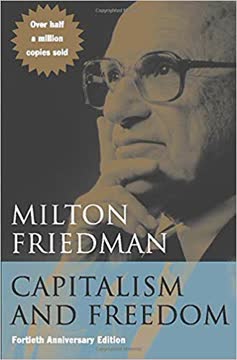




Download PDF
Download EPUB
.epub digital book format is ideal for reading ebooks on phones, tablets, and e-readers.
